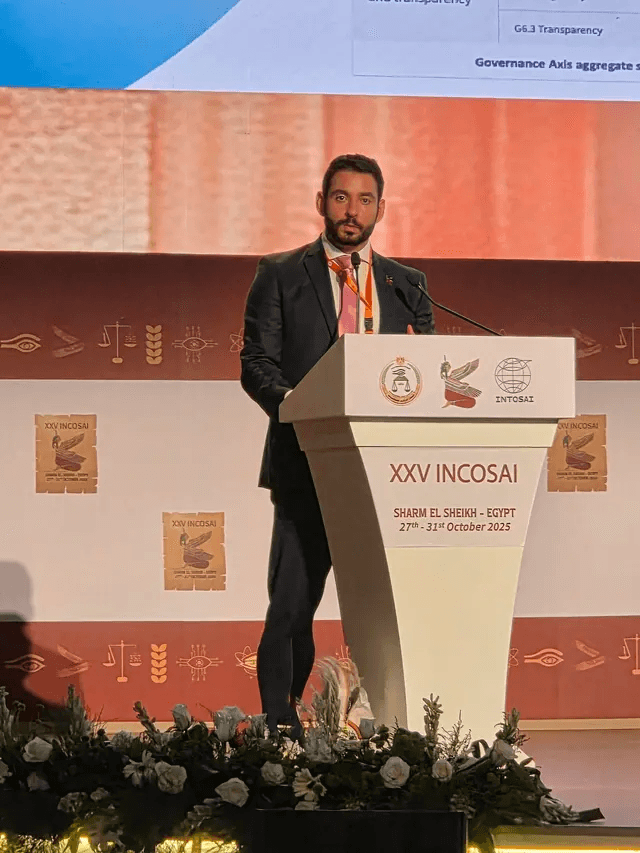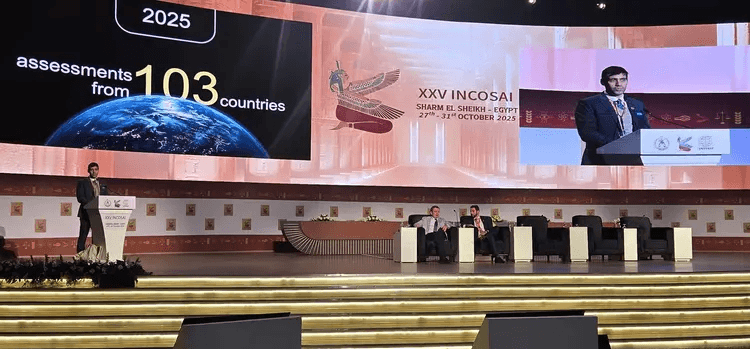TCU Presents Integrated Approach to Tackling the Climate Crisis in Egypt
At the XXV International Congress of Supreme Audit Institutions, Brazil showcased the results of ClimateScanner and the Energy Transition Practical Guide
By Secom / Serint

On October 30, the Brazilian Federal Court of Accounts (TCU) presented Brazil's legacy in tackling the climate crisis, work developed over its three years as chair of the International Organization of Supreme Audit Institutions (INTOSAI). The results were showcased at a side event held during the XXV International Congress of INTOSAI (XXV INCOSAI) in Sharm El Sheikh, Egypt.
TCU auditors Dashiell Velasque and Guilherme Souto presented to INTOSAI members the integrated approach developed under TCU leadership to address the complexity of the climate crisis. The work connects two pioneering initiatives worldwide: a global and standardized assessment of countries climate governance maturity and a methodology to guide countries on how to take action toward a fair and inclusive energy transition.

The products resulting from the integrated work coordinated by TCU are the ClimateScanner tool, which allows for the construction of a global overview, and the Energy Transition Practical Guide, which provides an assessment for the energy sector. These tools reflect the TCU's vision of government audit that not only points out shortcomings but actively builds solutions for a sustainable and well-governed future, explained TCU auditor Guilherme Souto.

TCU president, Minister Vital do Rêgo, opened the side event and emphasized the success of international cooperation.
Both initiatives share the same goal: to support supreme audit institutions in developing more transparent, fair, and sustainable public policies. They also show that it is possible to work together to tackle the challenges of the contemporary world, said Vital.
ClimateScanner
Dashiell Velasque began his presentation by highlighting the importance of coordinated action among countries to address the global challenge of the climate crisis. We must build joint solutions to achieve real results. Isolated actions are not enough to solve the climate issue, he said.

According to Velasque, 103 countries have already completed the assessment using the ClimateScanner tool. Among them, 9 out of 10 do not know how much they invest to tackle the climate crisis, and 7 out of 10 have insufficient medium and long-term plans to deal with the consequences of climate change. In addition, 8 out of 10 do not consider vulnerable groups in their climate plans.
The results derived from the ClimateScanner tool will be presented at the 30th United Nations Climate Change Conference (COP30), which will take place between November 10 and 21 in Belém, Pará, Brazil.
The methodology was developed by TCU in partnership with the Working Group on Environmental Auditing (WGEA) and 17 other audit institutions from around the world. More than 250 auditors from 142 audit institutions were trained in seven regional workshops.
Energy Transition Practical Guide
TCU auditor Guilherme Souto led the presentation on the Energy Transition Practical Guide and highlighted the importance of robust global governance to ensure the effective, transparent, and fair application of global investment in energy transition. If poorly managed, the energy transition risks generating economic instability, deepening inequalities, and creating new tax burdens, he stressed.

According to Souto, audit institutions play a strategic role in building the trust needed to accelerate climate action. The Energy Transition Practical Guide stands out as a concrete and applicable tool. The guide innovates by creating a method to monitor whether the transition is combating energy poverty and promoting equity, explains Souto.
The guide is available for download in Portuguese, English, and Spanish and was developed under the leadership of TCU, in partnership with the Working Group on Audit of Extractive Industries (WGEI) and the Organization of Latin American and Caribbean Supreme Audit Institutions (OLACEFS), with technical input from the International Energy Agency (IEA).
